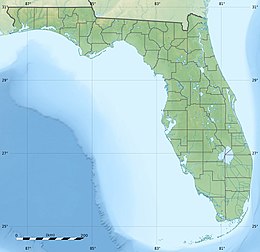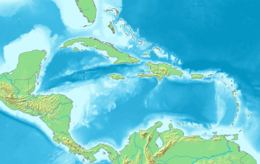| Revision as of 22:45, 7 August 2013 edit99.9.198.57 (talk) This is america, we use periods, not commas, and acres, not hectares.Tag: Visual edit← Previous edit | Latest revision as of 17:53, 26 December 2024 edit undoCielquiparle (talk | contribs)Autopatrolled, Extended confirmed users, New page reviewers35,656 edits Join Misplaced Pages:WikiProject Unreferenced articles +refTag: Visual edit | ||
| (8 intermediate revisions by 8 users not shown) | |||
| Line 1: | Line 1: | ||
| {{Short description|Island in the lower Florida Keys, United States}}{{More citations needed|date=December 2024}}{{Infobox islands | |||
| {{Unreferenced|date=April 2009}} | |||
| | name = Park Key | |||
| ⚫ | |||
| | native_name = | |||
| | native_name_link = | |||
| | native_name_lang = | |||
| | sobriquet = <!-- or |nickname= --> | |||
| | image_name = Park Key.jpg | |||
| | image_size = | |||
| ⚫ | | image_caption = Tiny uninhabited '''Park Key''' acts as a natural ] for US-1 | ||
| | image_alt = | |||
| | image_map = | |||
| | map_alt = | |||
| | map_size = | |||
| | map_caption = | |||
| | pushpin_map = Florida#Caribbean | |||
| | pushpin_label = | |||
| | pushpin_label_position = left | |||
| | pushpin_map_alt = | |||
| | pushpin_relief = 1 | |||
| | pushpin_map_caption = Park Key | |||
| ⚫ | | coordinates = {{Coord|24.653|-81.549|type:isle_region:US-FL|display=it}} | ||
| | etymology = | |||
| | location = ] | |||
| | grid_reference = <!-- UK only --> | |||
| | archipelago = ] | |||
| | waterbody = ] | |||
| | total_islands = | |||
| | major_islands = | |||
| | area_km2 = | |||
| | area_footnotes = | |||
| | rank = | |||
| | length_km = | |||
| | length_footnotes = | |||
| | width_km = | |||
| | width_footnotes = | |||
| | coastline_km = | |||
| | coastline_footnotes = | |||
| | elevation_ft = | |||
| | elevation_footnotes = | |||
| | highest_mount = | |||
| | country = {{USA}} | |||
| | country_admin_divisions_title = State | |||
| | country_admin_divisions = ] | |||
| | country_admin_divisions_title_1 = County | |||
| | country_admin_divisions_1 = ] | |||
| | country_admin_divisions_title_2 = | |||
| | country_admin_divisions_2 = | |||
| | country_capital_type = | |||
| | country_capital = | |||
| | country_largest_city_type = | |||
| | country_largest_city = | |||
| | country_capital_and_largest_city = | |||
| | country_largest_city_population = | |||
| | country_leader_title = | |||
| | country_leader_name = | |||
| | country_area_km2 = | |||
| | demonym = | |||
| | population = | |||
| | population_as_of = | |||
| | population_footnotes = | |||
| | population_rank = | |||
| | population_rank_max = | |||
| | density_km2 = | |||
| | density_rank = | |||
| | density_footnotes = | |||
| | languages = | |||
| | ethnic_groups = | |||
| | timezone1 = | |||
| | utc_offset1 = | |||
| | timezone1_DST = | |||
| | utc_offset1_DST = | |||
| | website = | |||
| | additional_info = | |||
| | footnotes = | |||
| }} | |||
| ⚫ | '''Park Key''' is an uninhabited island in the lower ] about {{convert|14|mi|km}} east of ]. It is 1500 meters long, and between 75 and 260 meters wide (190 meters on the average). It measures {{convert|70|acre|ha|abbr=off}} in area. | ||
| The island was made from fill, so that the railroad and later the road bed could be laid down.{{Citation needed|date=December 2024}} It is a habitat for '']''.<ref>{{Cite journal |date=September 29, 2015 |title=Endangered and Threatened Wildlife and Plants; Endangered Species Status for Chamaecrista lineata var. keyensis (Big Pine Partridge Pea), Chamaesyce deltoidea ssp. serpyllum (Wedge Spurge), and Linum arenicola (Sand Flax), and Threatened Species Status for Argythamnia blodgettii (Blodgett's Silverbush) |url=https://www.proquest.com/docview/1717299358/E82F25DC853149B6PQ/2 |journal=The Federal Register / FIND |volume=80 |issue=188 |via=ProQuest}}</ref> | |||
| ⚫ | '''Park Key''' is an uninhabited island in the lower ] about 14 |
||
| ⚫ | ] (or the ]) crosses Park Key at about mile marker 18, between ] and ] in the middle of Upper Sugarloaf Sound. It serves only as a causeway and is uninhabited. | ||
| It is an island made from fill, so the railroad and later the road bed could be laid down. | |||
| ==References== | |||
| ⚫ | ] (or the ]) crosses Park Key at |
||
| {{Reflist}} | |||
| {{Florida Keys}} | {{Florida Keys}} | ||
| ⚫ | {{Coord|24.653|-81.549|type:isle_region:US-FL|display= |
||
| {{authority control}} | |||
| ] | ] | ||
| ] | |||
| ] | |||
| {{ |
{{monroeCountyFL-geo-stub}} | ||
Latest revision as of 17:53, 26 December 2024
Island in the lower Florida Keys, United States| This article needs additional citations for verification. Please help improve this article by adding citations to reliable sources. Unsourced material may be challenged and removed. Find sources: "Park Key" – news · newspapers · books · scholar · JSTOR (December 2024) (Learn how and when to remove this message) |
 Tiny uninhabited Park Key acts as a natural causeway for US-1 Tiny uninhabited Park Key acts as a natural causeway for US-1 | |
  | |
| Geography | |
|---|---|
| Location | Gulf of Mexico |
| Coordinates | 24°39′11″N 81°32′56″W / 24.653°N 81.549°W / 24.653; -81.549 |
| Archipelago | Florida Keys |
| Adjacent to | Florida Straits |
| Administration | |
| State | Florida |
| County | Monroe |
Park Key is an uninhabited island in the lower Florida Keys about 14 miles (23 km) east of Key West. It is 1500 meters long, and between 75 and 260 meters wide (190 meters on the average). It measures 70 acres (28 hectares) in area.
The island was made from fill, so that the railroad and later the road bed could be laid down. It is a habitat for Linum arenicola.
U.S. 1 (or the Overseas Highway) crosses Park Key at about mile marker 18, between Lower Sugarloaf Key and Sugarloaf Key in the middle of Upper Sugarloaf Sound. It serves only as a causeway and is uninhabited.
References
- "Endangered and Threatened Wildlife and Plants; Endangered Species Status for Chamaecrista lineata var. keyensis (Big Pine Partridge Pea), Chamaesyce deltoidea ssp. serpyllum (Wedge Spurge), and Linum arenicola (Sand Flax), and Threatened Species Status for Argythamnia blodgettii (Blodgett's Silverbush)". The Federal Register / FIND. 80 (188). September 29, 2015 – via ProQuest.
This Monroe County, Florida location article is a stub. You can help Misplaced Pages by expanding it. |